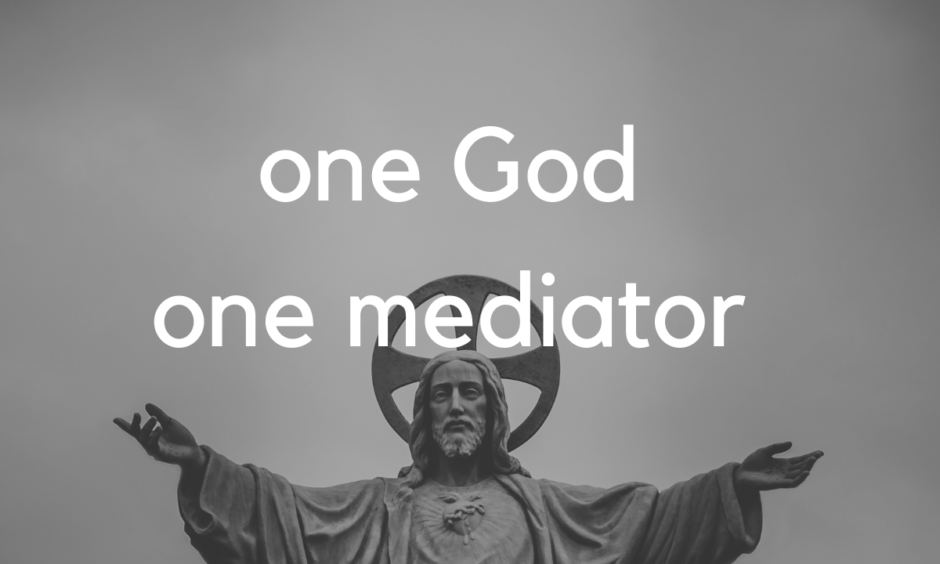There are some in life things that can be accomplished a dozen different ways. I’ve been doing some reading/youtubing to get a little smarter about how we grow our tomatoes, zucchini, and whatever else we decide to plant in our backyard garden, and there’s an over-abundance of options for navigating the path from seed to harvest. The same principle is true for losing weight, learning a language, having a better marriage, and much more. There are some basic core principles, but the specific path you take will be unique. As (rather crude) saying goes, there’s more than one way to skin a cat.
While it may be true that there are many paths to accomplish most of the various agendas we have in our lives, there are also areas where there’s only one way that will work, and often those are the areas that are the most crucial for us to get right. The salvation of our souls is one of those places, if what Paul says in 1 Timothy 2:1-7 has anything to say about it. We don’t have a dozen paths that all end at the same destination when it comes to eternity. Instead, Paul writes,
“ I urge, then, first of all, that petitions, prayers, intercession and thanksgiving be made for all people— for kings and all those in authority, that we may live peaceful and quiet lives in all godliness and holiness. This is good, and pleases God our Savior, who wants all people to be saved and to come to a knowledge of the truth. For there is one God and one mediator between God and mankind, the man Christ Jesus, who gave himself as a ransom for all people. This has now been witnessed to at the proper time. And for this purpose I was appointed a herald and an apostle—I am telling the truth, I am not lying—and a true and faithful teacher of the Gentiles.”
God our Savior
In the first few verses, Paul says that it’s pleasing to God when we pray for others and live quiet, holy lives because God desires all to be saved. For the moment we’ll set aside the debates and theological nuance of what exactly Paul means when he says that and save it for a separate post. After all, Paul has already said in chapter 1 that we aren’t to get trapped in foolish debates that don’t promote love.
What we can say with absolute confidence is that, like Paul says with confidence, is that God desires all to be saved. After all, he is “God our Savior” – Savior is part of who he is. This has significant implications for how we view this God. He’s not like the child who takes pleasure in stomping ants, uncaring of their lives. Instead, his love is broad and all-encompassing. While the fullness of Scripture makes it clear that not all will be saved, we can be sure that the lean of God’s heart is toward salvation, not condemnation.
Paul wants us to be clear on this as well, so he goes on:
One God
Paul draws on the central statement of the Hebrew faith, the shema, when he says “For there is one God” – echoing Deuteronomy 6:4’s statement, “ Hear, O Israel: The Lord our God, the Lord is one.” The oneness of God – the fact that he is the sole true Lord of all – is key to the Christian faith. We aren’t in the midst of a pantheistic reality where there are dozens or hundreds of gods, each with their own domain. While there are certainly opposing spiritual forces, there is only One God over all.
The essence of all idolatry is, at its root, a rejection of this reality. In Romans 1 Paul describes sin as turning from the creator to the creation, functionally deifying created objects and uplifting them in place of the One God. This one God desires all to be saved, but all have rejected God and his salvation, replacing it with idols made of stone or wood or flesh or coin, and in that rejection they have broken the relationship with their creator.
One broken relationship
Adam and Eve’s sin in the Garden of Eden was the first breaking of that relationship – the first rejection of the One God – as they chose to attempt to deify themselves by becoming more like God through eating of the forbidden fruit. Adam and Eve broke God’s law when they ate of the fruit, but that wasn’t the primary problem. The primary problem was that, in that breaking, they also disconnected themselves from the relationship they had with their creator.
It’s one thing to harm or break the relationship with another person. It’s another to break the relationship with God. As Job experiences, a mortal human, no matter how righteous, isn’t in a position to sit down and debate with God.
When I was in my early teens I stole some money from a friend’s parents, a foolish choice that, obviously, broke the relationship and their trust. However, I was able to sit down with them a month or two later, return the money with some additional, and apologize for my actions. But God is in heaven. He is holy. He is other; infinite, eternal, and so much more that is beyond me. How can I sit down with him and have a conversation unless there is a mediator? Someone who has a foot in both camps and can speak from experience for both sides.
That, beautifully and wondrously, is exactly what God has done in Jesus.
One Mediator
Jesus is that mediator. He is God incarnate, God taking on humanity so that he can sit down at the table and invite us into restored relationship with him. As Paul makes sure to point out, he “the man Jesus Christ.”
Just as God is one, so Jesus is the only mediator between man and God. Your religious performance can’t mediate on your behalf. The virgin Mary can’t mediate for you. Your good deeds aren’t effective mediators. Only Jesushas the power and position to stand and bridge the gap between humanity and the himself.
How does Jesus mediate? Not like you might expect. He doesn’t sit down at the table and have a conversation. No, things were past that. Humanity had rejected and blocked out the One God’s truth and love and light for millenia and our minds had become darkened. We needed someone to restore us, since we sure as hell weren’t going to take the step ourselves. Jesus’ mediation looks like his death upon the cross according to Paul. Jesus “gave himself as a ransom for all people.” His mediation is the giving of himself on our behalf.
Easter was a couple weekends ago. My first draft of this post was written on Good Friday. What better season to step back and remind ourselves that God desires all to be saved, but there is only one path to salvation? This isn’t skinning a cat, growing a garden, or writing a blog post. There’s only one way. The way is wide open, but it is narrow. Jesus delights to mediate for you. He, His Father, and the Spirit long to restore in you what is broken. Come to him!
If you’re religious, set aside your weight of activities and see the love in your Father’s face. If you’ve thrown out religion as a waste, know full well that the things of the world will never satisfy. Your soul longs for something, for someone, more. And He desires, earnestly, that you be saved and brought into the beautiful, life-giving relationship you were created for with Him. Come to the one who has made a way. Accept the ransom on your behalf. Hear the Apostle’s testimony, given at the proper time. Today is the day of salvation. Hear, and believe.





No Comments